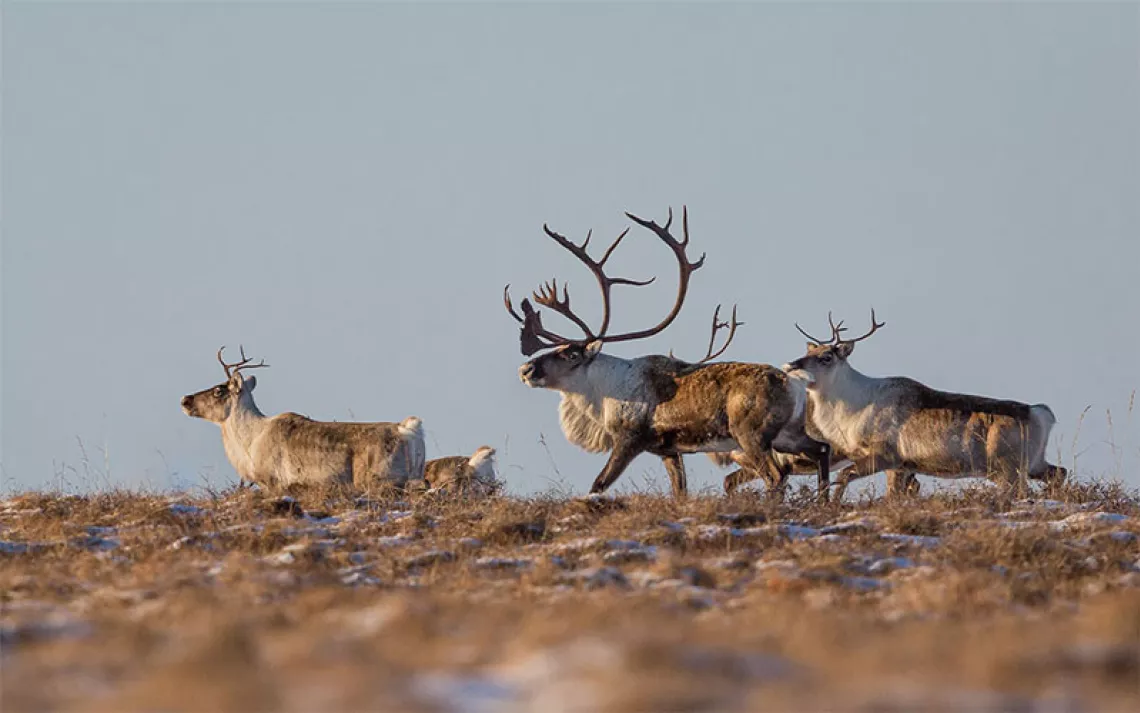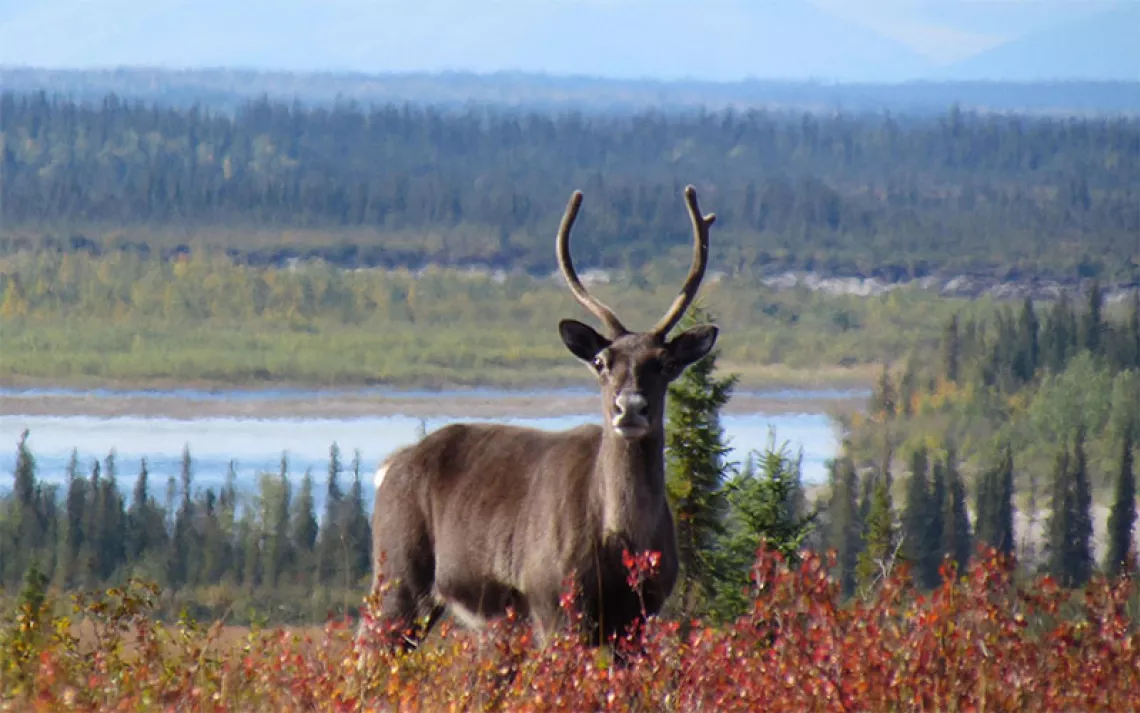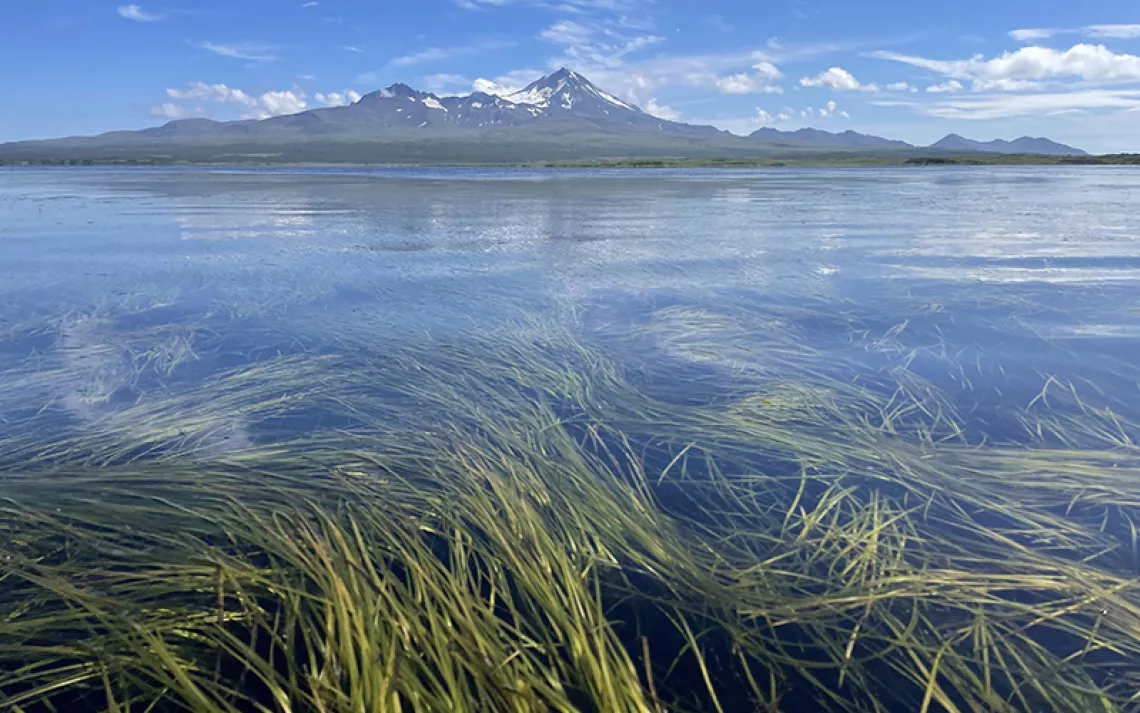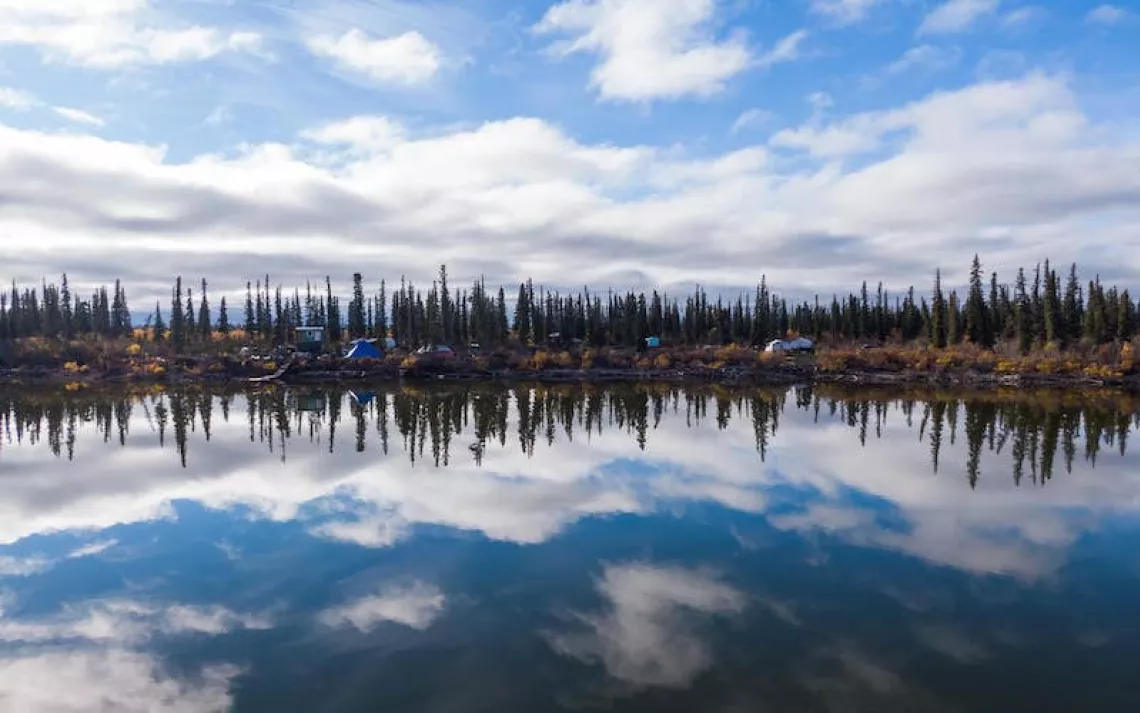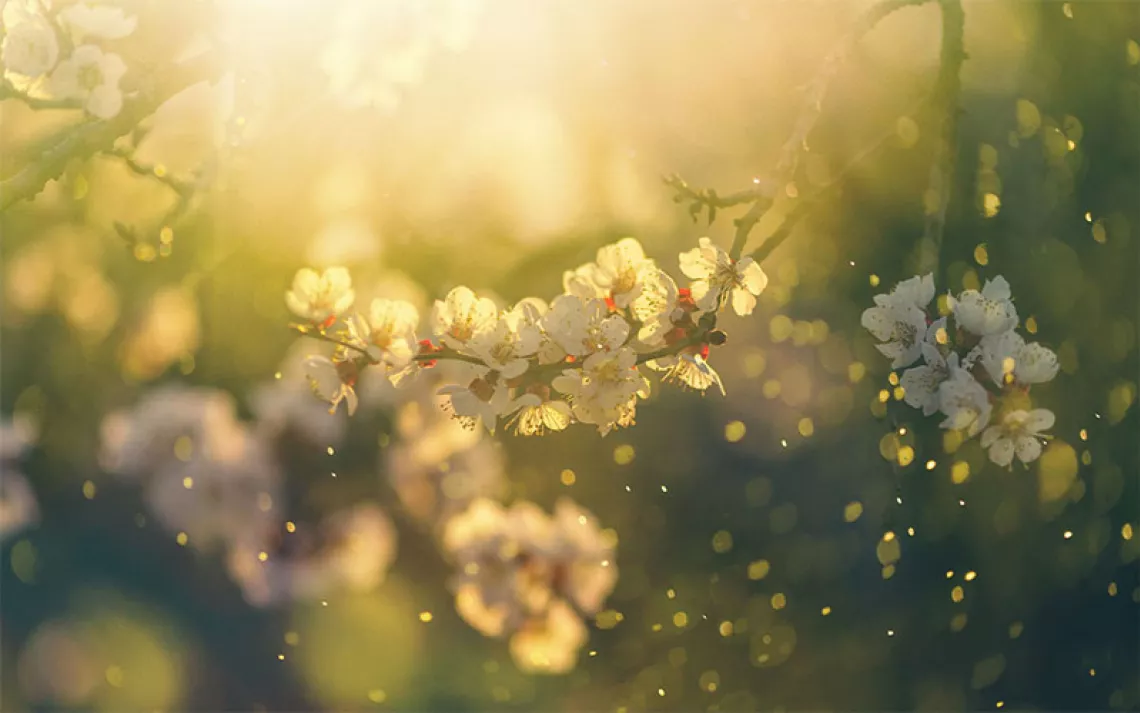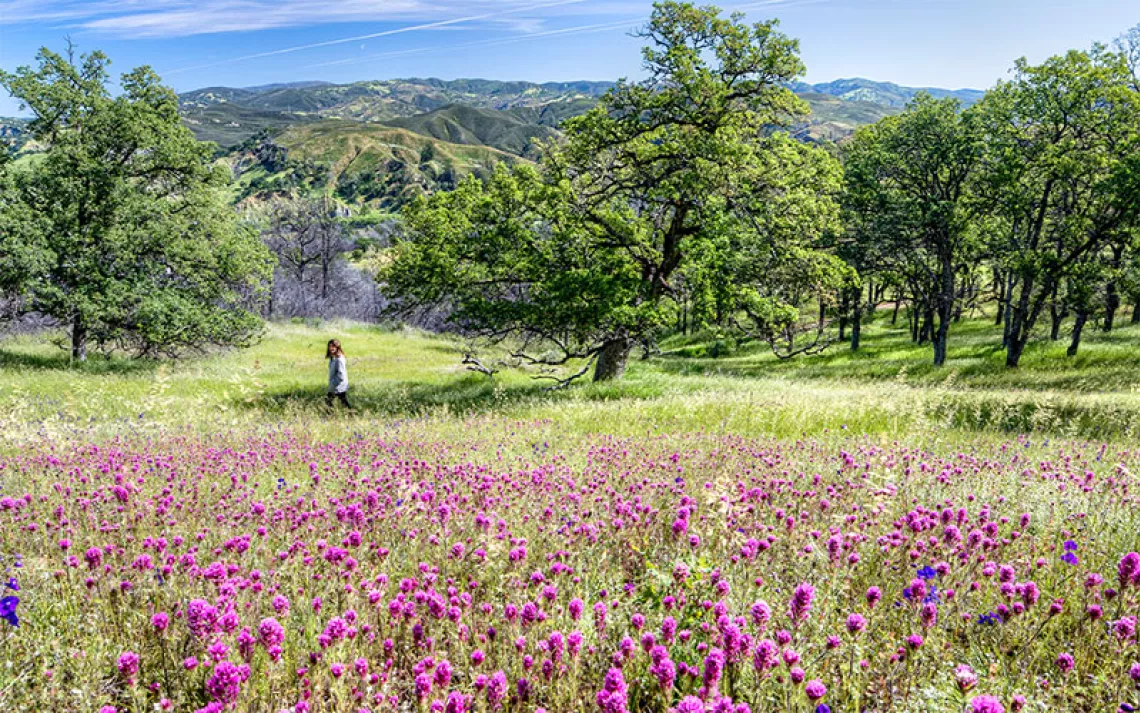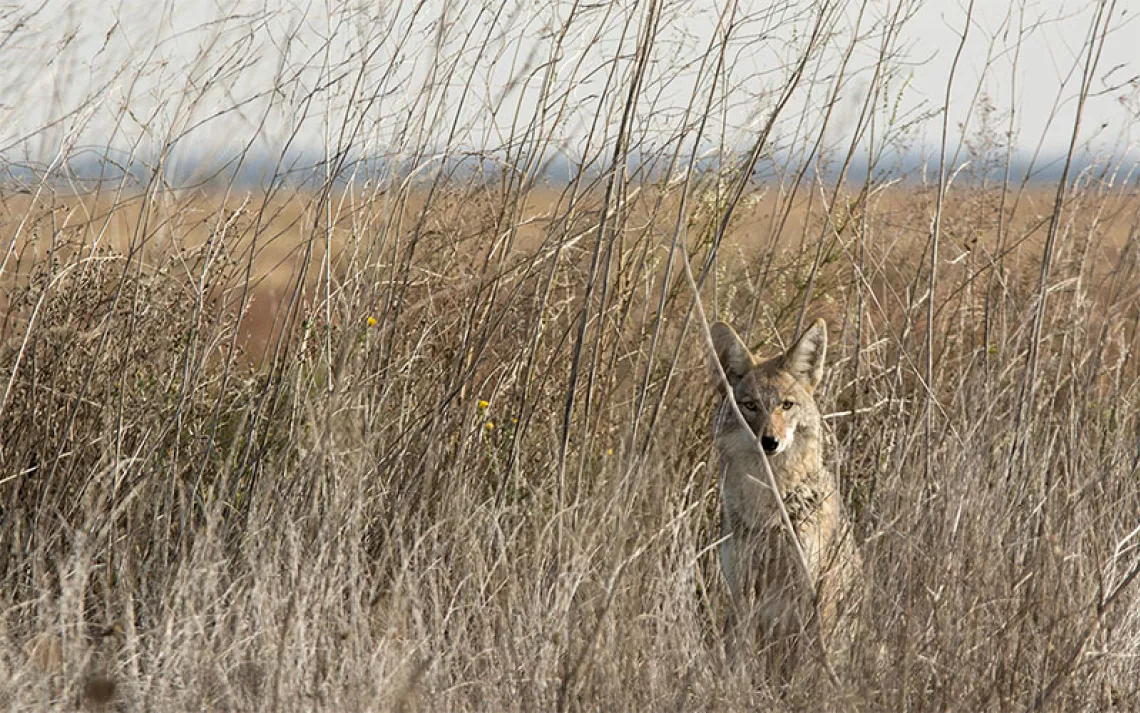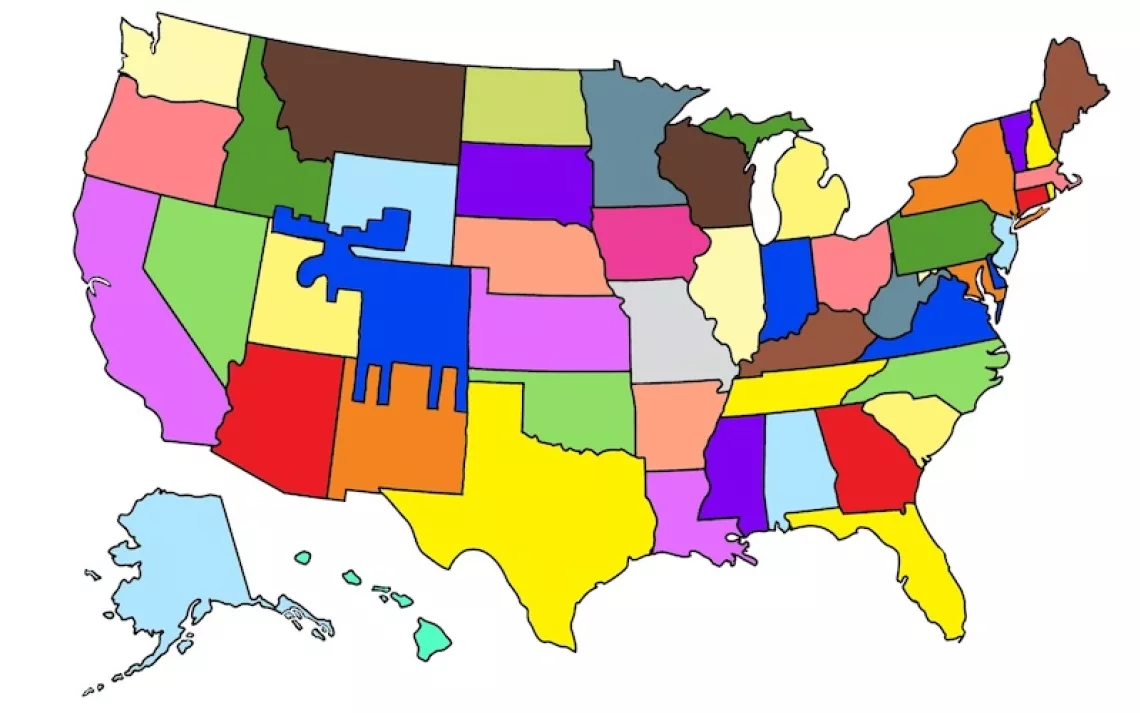Go With the Floe
Gliding through time in Glacier Bay
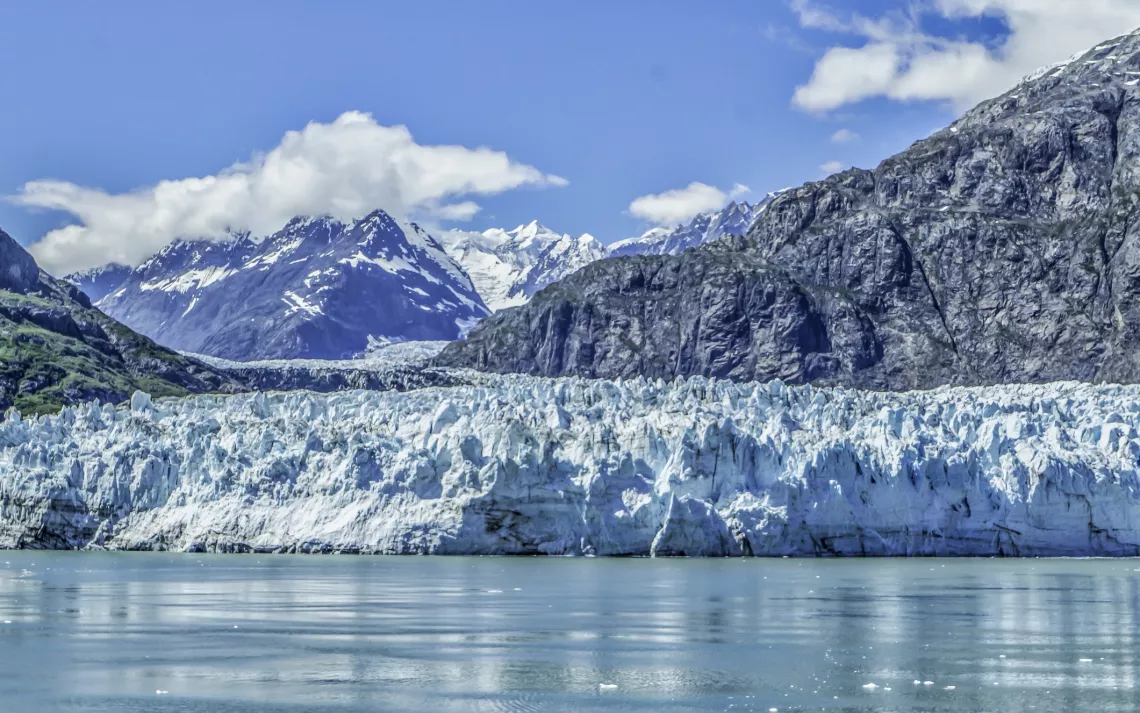
During the first summer of what would become a 25-year love affair with Alaska, Kim Heacox was a fresh-faced seasonal park ranger discovering Glacier Bay National Park and Preserve. In The Only Kayak (Lyons Press, 2005), Heacox chronicles the impact the "last wild shore, 900 miles north of Seattle and 900 years in the past," has had on him. The book begins with his first paddling trip among Alaska's glaciers, a tale Sierra has adapted here.
YOU PADDLE A CANOE; YOU WEAR A KAYAK.
It was my first day in wild Alaska. Rudder down. Life vest on. The whereabouts of my tide tables, map, and compass escaped me. I couldn't find them and didn't care as I approached the luminous tidewater face of Reid Glacier.
Blue minarets of ice tipped away at precarious angles. Others stood as fractured fins and flying buttresses 200 feet tall, certain to fall any day. Any minute. A light rain washed the ice and rock, the kayak, and me. Delicate streams dripped off my hat into Reid Inlet, where each droplet beaded diamond-like before joining the great whole of the silt-laden sea. Birds called in dialects of kittiwake and tern. A harbor seal watched me with obsidian eyes, only its head above the water, its whiskered face a cipher of mistrust. Long memory, no doubt, from when Tlingit Indians hunted seals in boats of similar design.
Icebergs surrounded me, this one a castle, that one a swan, each a corridor into the magic we know as children but lose as adults.
My knees were braced against the inside of the kayak. My gear was packed in plastic garbage bags stuffed into compartments forward and aft. Not much room to maneuver. My feet operated pedals connected to thin cables that controlled the rudder. Push on the left pedal and the kayak went left; push on the right and it went right. Sit still and it obeyed the higher calling of wind and tides.
I glided forward, thinking that a kayaker's passage through Glacier Bay is more like that of light through water, a refraction, a silent process of changing--and being changed--with each pull of the paddle and chant of the rain, each soft landing of snowflake on icefield. You hear the idioms of ice, the crystals cracking, the glacier groaning. You brace for the icefall that doesn't come because the glacier has more patience than you. You think about geologic time, the depth of an epoch, the tiny tenure of a single human life.
I stopped paddling yet continued moving forward as I shared my fate with Richard Steele, a boatman of mysterious pedigree and questionable nautical skill, who managed to torque our two-man kayak with each exuberant stroke. A big-shouldered, deep-chested fellow, Richard, when he paddled, didn't pull himself forward so much as he pushed the ocean behind. As best I could tell, he didn't intend to stop until we rammed the glacier. I wondered if he had his boots on the wrong feet, or if he flossed with twine. Three hundred yards from the blue ice wall. Two hundred and fifty, maybe 200. Hard to tell in an uncalibrated place.
"Uh, Richard," I said, "you think we're close enough?"
He stopped paddling.
We drifted among ice like so many stars in the sky. Constellations of ice. I scooped up one chunk in my hand. Shaped like an awl, with a sharp tip and a smooth, rounded grasp, it appeared as clear and delicate as glass.
From his sinking shoulders, I could read Richard's disappointment. He wanted an icefall. He wanted the glacier to perform. His head twitched, and he seemed to pace even when seated. The rain drummed steady as Ravel's Bolero as the sea chewed away at the glacial underpinnings, yet everything was eerily still.
Our map told us the surrounding mountains were 6,000 feet high. But the mapmakers were city fellows who didn't come out here. They offered no corrections for the imagination, which itself is a wild place.
We paddled to shore, if it could be called paddling. Our broad-beamed kayak was a boat with hips. In our attempt to slalom through the icebergs, we swaggered and hit every other one. The smaller bergs we glided over. Their percussive music tapped our hull. Hundreds of bergs bejeweled the shore where the receding tide had abandoned them. Holy bergs, they seemed to glow from within, each with its own lambent light. We extricated ourselves from our kayak and walked among them. Richard estimated they weighed tens of tons.
He took off for the glacier, half a mile away, said he wanted to "investigate" an ice cave in its flank. Perhaps walk into it. He moved over the rocky, mossy slope like a fullback. His powerful chest and arms were those of an eagle, a great soaring bird that by comparison made a hardworking heron of me.
I HAD MET RICHARD A WEEK BEFORE when our National Park Service supervisor introduced us in a Juneau grocery store and told us we'd be roommates in Glacier Bay for the summer. Richard squared up to me and shook my hand gently, a surprising gesture from the big-shouldered man. He pushed his cart down the aisle and threw in boxes and bags. Twenty pounds of popcorn, ten pounds of spaghetti, a weightlifter's bag of flour, a vat of yogurt, a tub of honey, and four large jars of peanut butter. Richard said, "I'm going kayaking for a week. You want to come along?"
He talked about kayaks and how Native Alaskans had been perfecting them for 5,000 years. Swift and silent, the Native kayaker wore a hat made of wood with a long visor to shed the rain. Believing that seals loved beauty, the wife made the hat ornate so her husband could approach them closely. He used a sea lion bladder for a canteen or filled it with air as a buoyancy bag. He used a small gaff to haul in fish and a large gaff to haul himself onto ice floes. When a storm blew, the hunter would take refuge in a bed of kelp, the forest of the sea, and wrap the long fronds around his little boat. Snuggle deep into the hull to wait for the waters to lie down.
As Richard spoke, he seemed to become a hunter himself, though he had no wife and no wooden hat, and the kayak he intended to use was an old fiberglass hog patched with duct tape and glue.
"Still," he said, "a kayak is special. It's something you..."
"Something you wear?" I said.
"Right, it's something you wear. How much beer should we get?" He loaded four cases into the bulging cart, and a bottle of whiskey, and headed for the checkout stand.
IN REID INLET WE WERE TWO MEN in a little boat, rookie park rangers in Alaska who had no idea what we were doing. Richard had come from the Everglades, I from Death Valley. To say we were naive would have been generous. From reading our embellished summer park ranger applications, you'd have thought we were Leatherstocking and Black Elk, brother hunters in the wilderness, sons of the earth.
We had only a topographic map that showed Reid Inlet as a tiny blue smudge on a vast arc of the wildest coast in North America, a tectonic jumble of mountains, glaciers, rivers, inlets, and coves without a single trail or road. Our rain gear lasted ten minutes before it started to leak. A wind blew off the glacier with no hint of sympathy. We had no thermometer, other than our red and runny noses. Richard had cracked our only compass.
"Don't worry," he said as he barreled off to explore Reid Glacier. "We don't always want to know where we're going."
All that night the glacier calved columns of ice into the sea. Pleistocene thunder filled our dreams until sometime before dawn. Unable to sleep, we climbed from our tent and sat on the ground with our legs crossed and our backs against the cold. Like two monks before heaven, we watched one icefall after another, each more illuminated than the one before in the emerging light of day.
AS IT TURNED OUT, THERE WAS A CABIN in Reid Inlet. It belonged to Joe and Muz Ibach, who had used it as a summer home for nearly 20 years as they prospected for gold. Richard and I were determined to find it.
A timpani of rain played on our kayak. In the presence of seals, we signed with our hands so as not to alarm them. We heard the puff and blow of a harbor porpoise, the muted music of birds. We sensed something descended through the ages. With so many landscapes having been shaped by man the past 10,000 years, it was nice to find one that could still shape us.
Onshore that night, near the Ibach cabin, we found a plover that walked away when we approached. But once we sat still, it came within a couple of feet and issued a thin peeping call. We might have picked it up and cupped it in our hands.
In the wilderness you learned what was authentic and what was not. To boot up meant to put on your boots, not turn on your computer. A mouse was still a mouse. Software was warm socks. Hardware was your kayak. You slept on the ground until you were uncomfortable in a bed. You breathed fresh air until you suffocated indoors. You laughed from your toes and flew in your dreams. You found that you could sing the high notes, that true wealth was not a matter of adding to your possessions but of subtracting from the sum of your desires. You understood what was enough and what was too much and why the prophets went into the desert alone. You accepted impermanence, or at least you thought about it. You regarded the powerful and the large but also the small and unheralded. You thought about relationships more than names, stories more than statistics. You learned an economy of motion in each synchronous stroke, watching the paddles rise and fall, the blades up and down, the droplets dripping away with unspeakable grace. You found that every tool had a simple yet profound value: map, knife, tide table, tent, tarp.
Ah yes, tent and tarp. Day four, and we had had rain from everywhere and nowhere; a maelstrom and a mist; a reign of rain and a find-every-leak-in-the-tent rain; rain to texture a leaf and make a flower nod, to make a glacier grow.
"It is now about half-past nine and raining pretty hard," wrote Harry Fielding Reid when he returned to Glacier Bay in 1892. "We have concluded that there are many infallible signs of rain in this region. If the sun shines, if the stars appear, if there are clouds or if there are none; these are all sure indications. If the barometer falls, it will rain; if the barometer rises, it will rain; if the barometer remains steady, it will continue to rain."
With the barometer steady, Richard and I paddled out of Reid Inlet into the West Arm of Glacier Bay. Shawls of fog rendered the mountains into an impressionist's view. Every point was a vanishing point. I thought, "It should always be like this." No painting would be right in Glacier Bay were it not a watercolor and no photograph true were it not a black and white. Looking south toward Icy Strait, then north beyond Russell Island, we breathed the distance and attempted to grasp the full history of glacial advance and retreat.
When Reid did his work here, a great tidewater glacier commanded this view, six miles across, broken in the middle by Russell Island as it emerged from the retreating ice. Reid lost his boat to the tides three times that summer of 1892. Each time he had to swim for it. Once he nearly drowned. John Muir stayed in California that year and founded the Sierra Club. Walt Whitman died and Rudolf Diesel, a German inventor, patented the internal-combustion engine. A century later America would have 10,000 exhaust pipes for every poet, and people would wonder why the climate was changing.
The next morning we rounded an islet off Russell Island and flushed 30 scoters that circled back to see what had frightened them, their wings beating a complaint. "Maybe our only kayak is one too many," I said.
I mentioned something about regretting my own birth. Too many people in the world. Extinctions everywhere. More dogs in Juneau than wolves in Alaska. Our chocolate running low. No more whiskey. The Beatles breaking up.
Richard said, "Let's go find a cliff and jump off it."
THE NIGHT WAS MOONLESS when the rain stopped and the stars had their way, and we slept onshore with the sea-tossed shells and the tangled kelp, and nothing seemed urgent because nothing was. Whales swam into our dreams. I heard a spouting in the distance, a deep breathing through the fog.
"Was that a whale?" I asked Richard the next morning. "Or was it a dream?"
He whispered an echo from Ishmael, "And I alone am escaped to tell thee."
The only kayak in Glacier Bay, we too were alone, and escaped, left to wonder how long it could last, this wildness and grace. Not forever. But at that moment it was the most beautiful place on Earth. The ice, the sea, the rain. In that transitory, enchanted moment, it was perfect.
 The Magazine of The Sierra Club
The Magazine of The Sierra Club
